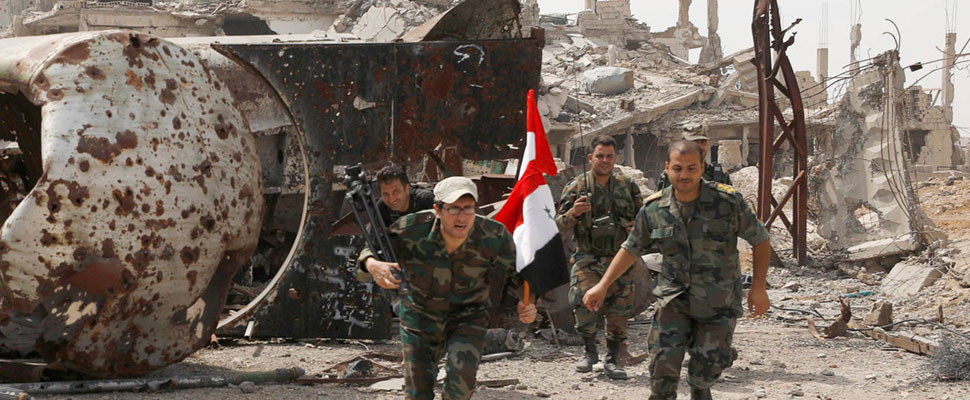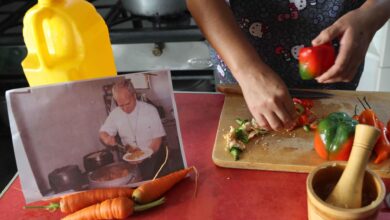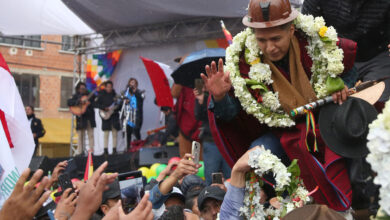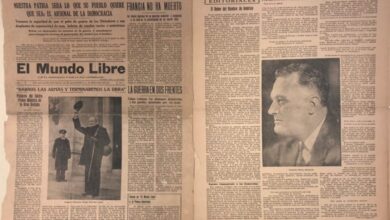Yarmuk: A symbol of Palestinian resistance, today is a ghost town
8 kilometers south of Damascus lies Yarmouk, an area famous for being the epicenter of the Palestinian diaspora in Syria and the Middle East. Today, of the population of more than 150,000 Palestinians who lived there, there are less than a thousand

Since 2012, the Syrian conflict came to Yarmouk, and the bombings of the last month are one of the most violent that has taken place there. According to the news media Al Jazeera, the Syrian regime significantly escalated its offensive to regain full control over Damascus. On May 21, it reported the recapture of most of the southern district of the capital, taking out the last members of Daesh (ISIL) who remained in small enclaves around Yarmouk. It is the first time in seven years that the regime could manage to have total control of the Damascus area.
Leer en español: Yarmuk: el símbolo de la resistencia palestina, hoy es un pueblo fantasma
Yarmuk was founded by the Syrian government in 1957 as a refugee camp for Palestinians, but it soon became another district of Damascus where Syrians and people from other nationalities lived. It was one of the fields in the Middle East that offered a better quality of life to the Palestinian people, and there they built a prosperous community integrated with the local population. Until the conflict erupted, Yarmuk was the center of Palestinian identity in Syria par excellence and a symbol of Arab resistance against Israel.
According to the BBC, life in Yarmouk was bearable, and despite the presence of different Palestinian political factions, there was a certain camaraderie and mutual understanding. In March 2011, with the outbreak of protests throughout Syria, most Palestinians sought to remain neutral. On the one hand, several political factions were always allies of the regime. On the other, the community did not want to jeopardize the life they had built for generations since entering Syria for the first time in 1948. Furthermore, after decades of Assad's rule, they were aware of the constant repression of any indication of opposition to the regime. For the Palestinian community, the most important thing was to survive because the Palestinian people have suffered the consequences of decades of dispossession and violence both in their territory and in exile (and exile in their own territory).
You can also read: Damascus at the command of Syria: The government of Bashar al Assad regained control
However, the situation worsened in Syria and the regime maintained pressure on the Palestinians not to join the opposition. On the other hand, the Free Syrian Army pressed to enter the field as it is a key point to reach Damascus. In December 2012, the regime bombed Yarmuk and the Free Syrian Army and its allies managed to enter. The community was caught in the middle of the clashes. Violence broke out once more in the lives of the Palestinians.
In July 2013 the regime imposed a state of siege, a strategy that has been used constantly in the recapture of most territories. The total blockade of Yarmuk was the beginning of one of the darkest chapters of this conflict. When the armed opposition groups were defeated by the blockade, Daesh managed to enter in 2015 and impose greater terror and desolation in Yarmouk. Devastation and famine have prevailed since the last 5 years, according to the BBC.
With this last wave of offensives of the regime, the remaining members of Daesh have been evacuated or defeated. The number of civilians killed is uncertain, but high due to famine, lack of access to medical services, and bombing. According to data from the United Nations (UN), only during the last week of April, 3,500 Palestinians were forced to flee. Around 100,000 Palestinians have been displaced in Syria since the beginning of the conflict. Yarmuk, the symbol of the Palestinian resistance, today is a ghost town. Today it is a symbol of a story of perpetual uncertainty that the Palestinian people continue to carry on their shoulders.
Latin American Post | Erika Alejandra Cortés Ibáñez
Translated from "Yarmuk: Un símbolo de la resistencia palestina, hoy es un pueblo fantasma"





